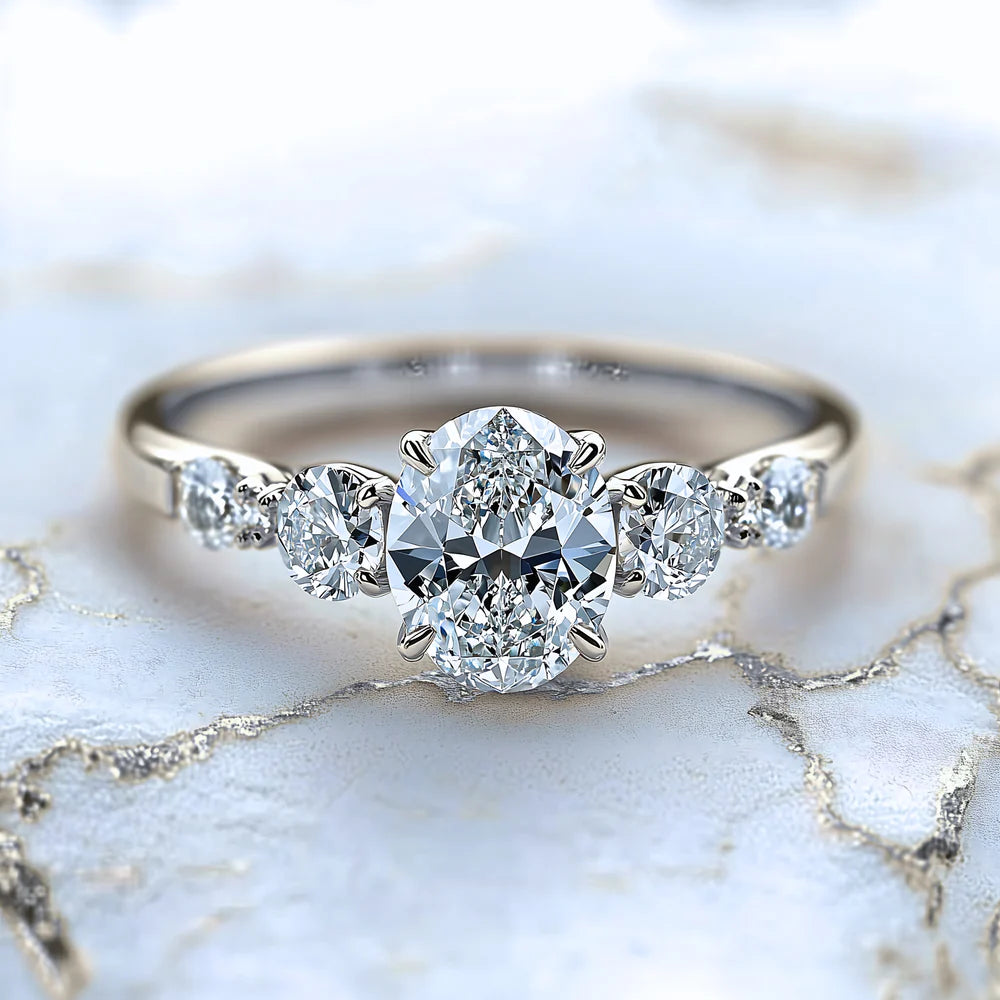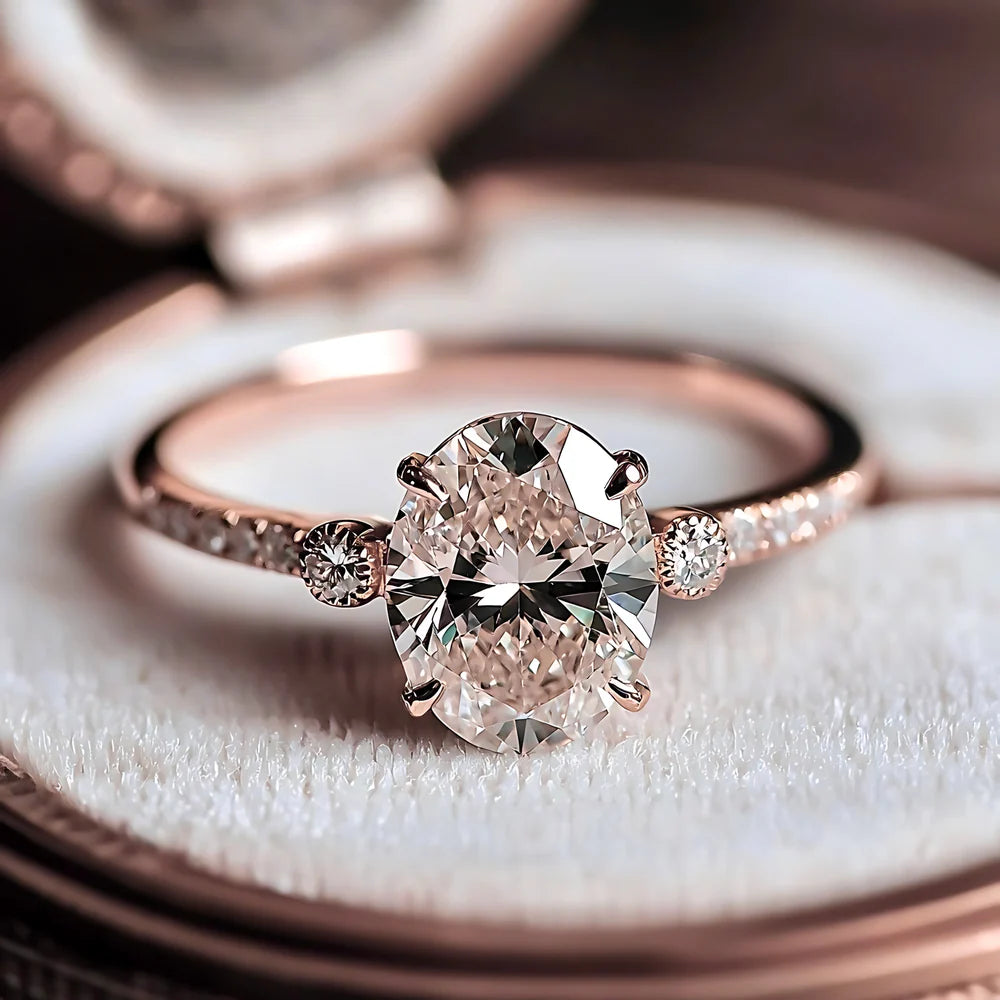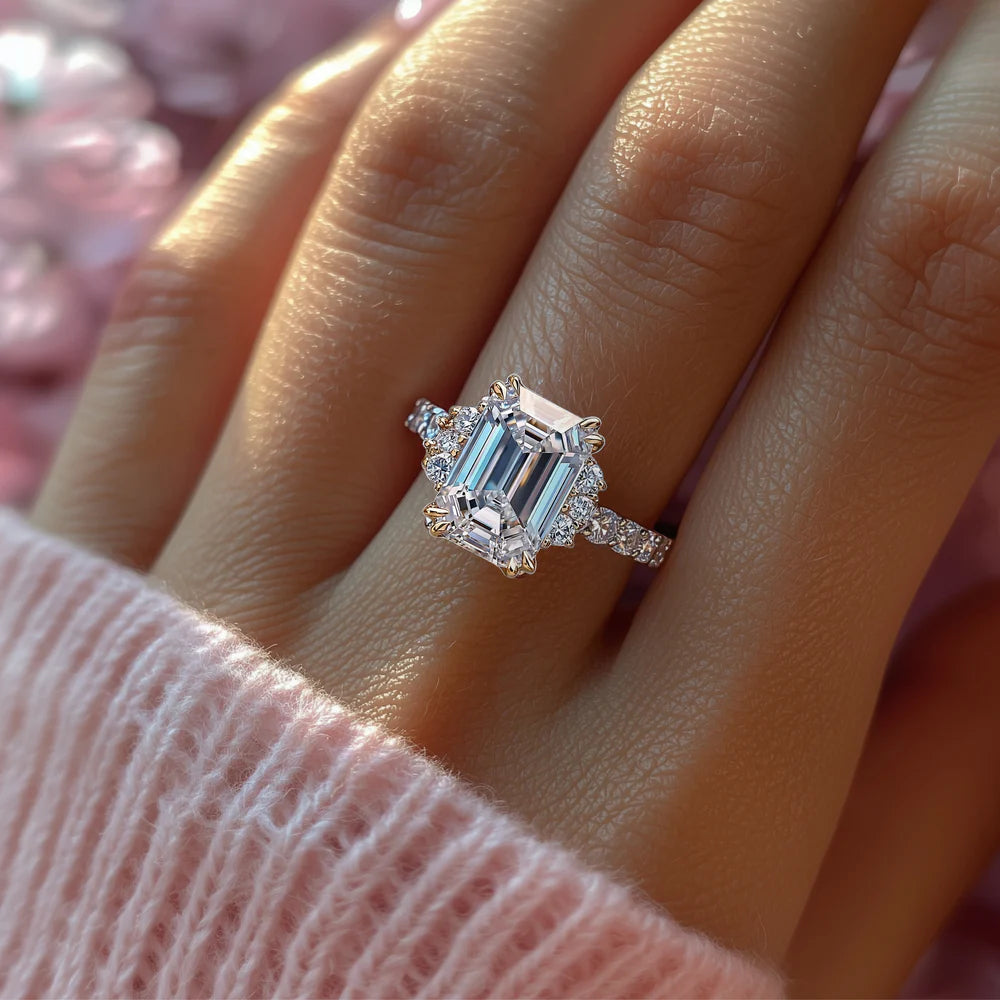
Moissanite vs Diamond for Engagement Rings: Which is Better?
When choosing an engagement ring, many are torn between the classic allure of diamonds and the rising popularity of moissanite. Both stones are stunning, durable, and capable of turning heads, but they have key differences in cost, sparkle, ethical considerations, and longevity. This guide breaks down each factor to help you decide which is truly better for your engagement ring—moissanite or diamond.
1. The Sparkle Factor: Which Gemstone Shines Brighter?
One of the first things people notice in an engagement ring is the sparkle, and both moissanite and diamonds offer incredible brilliance. However, the two stones have unique optical qualities that affect how they shine.
-
Moissanite: Known for its exceptional "fire," or rainbow-like sparkle, moissanite has a refractive index of 2.65-2.69, which is higher than diamond’s. This means moissanite disperses light more intensely, creating a vibrant, colorful sparkle that some find more noticeable and "flashy."
-
Diamond: Diamonds have a refractive index of 2.42, giving them a classic, white sparkle. Their "brilliance" is often described as more subtle and elegant compared to moissanite’s colorful fire. Diamonds also exhibit a higher level of scintillation, the "twinkling" effect as they move under light.
Which is Better? If you prefer a colorful, eye-catching sparkle, moissanite wins. For a more classic, white sparkle, diamonds are ideal.
2. Durability: Which Stone Holds Up Better Over Time?
Engagement rings are meant to be worn daily, so durability is essential. Let’s look at how moissanite and diamonds stack up in terms of hardness and longevity.
-
Diamond: Diamonds are the hardest known natural substance, scoring a perfect 10 on the Mohs scale. This makes them extremely scratch-resistant, ideal for daily wear without the risk of scratches or chips.
-
Moissanite: With a hardness of 9.25, moissanite is also very durable and suitable for everyday wear. While slightly softer than diamonds, moissanite is still harder than most other gemstones, meaning it won’t scratch or chip easily.
Which is Better? Diamonds are technically harder, but moissanite’s 9.25 rating is more than sufficient for daily wear. Unless you’re planning on extreme activities, moissanite’s durability is comparable to diamonds.
3. Cost Comparison: Which Offers Better Value?
One of the biggest differences between moissanite and diamond is the price, and this factor alone is a major reason many people choose moissanite.
-
Moissanite: A 1-carat moissanite stone typically costs between $600 and $1,000, depending on the cut and quality. Moissanite’s affordability makes it a popular choice for budget-conscious buyers who don’t want to compromise on appearance.
-
Diamond: A 1-carat diamond of comparable quality can easily cost upwards of $5,000, with prices fluctuating based on the 4 Cs (cut, color, clarity, and carat). The high price of diamonds is due to their perceived rarity, extensive marketing, and traditional association with luxury.
Which is Better? Moissanite offers a high-quality, sparkling stone at a fraction of the cost of a diamond, making it ideal for those who want the look of a diamond without the steep price.
4. Ethical and Environmental Impact: Which is the Responsible Choice?
Ethical considerations are increasingly important to modern couples. Here’s how moissanite and diamonds differ in terms of their social and environmental impact.
-
Moissanite: Moissanite is lab-created, meaning it is conflict-free and has a minimal environmental footprint. Its production doesn’t involve mining, making it a more eco-friendly choice for those concerned with sustainability.
-
Diamond: Natural diamonds are often associated with ethical and environmental issues, including conflict diamonds and ecological damage from mining. While many diamonds are now certified conflict-free, the mining process still has a significant environmental impact. Lab-grown diamonds are a more sustainable option, but they’re still pricier than moissanite.
Which is Better? For environmentally conscious buyers, moissanite is the clear choice. It’s lab-grown, conflict-free, and sustainable.
5. Clarity and Color: Which Looks More Perfect?
Both diamonds and moissanite are available in various grades of clarity and color, but there are key differences due to their origins.
-
Moissanite: Moissanite is typically lab-grown, so it is generally free of inclusions or imperfections. High-quality moissanite stones appear near colorless and are manufactured to achieve a consistent level of brilliance and clarity.
-
Diamond: Diamonds are graded on the GIA’s color and clarity scale. Colorless diamonds (grades D-F) are rare and expensive, while stones with inclusions or color imperfections are more affordable. Natural diamonds often contain inclusions that are visible under magnification, which can slightly affect sparkle.
Which is Better? Moissanite generally offers a consistent, clear appearance due to its lab-grown origins, while diamond quality varies significantly based on clarity and color grades.
6. Symbolism and Tradition: The Emotional Factor
For many people, diamonds hold a symbolic meaning that moissanite does not. Diamonds have long been associated with luxury, tradition, and lasting love, thanks to decades of marketing and cultural reinforcement.
-
Diamond: Often seen as a symbol of eternal love, diamonds have a traditional appeal that moissanite doesn’t yet hold. Some people value the emotional and cultural significance of a diamond as part of their engagement ring.
-
Moissanite: While moissanite doesn’t have the same historical or cultural weight, it’s gaining popularity as a modern, ethical, and affordable choice. Couples who choose moissanite often appreciate it as a symbol of conscious decision-making and a break from tradition.
Which is Better? If you prioritize tradition and symbolic value, diamonds may resonate more. If you’re open to a fresh, modern take on engagement rings, moissanite offers a beautiful and thoughtful alternative.
7. Resale and Investment Value: Which Holds Value Over Time?
Diamonds are often marketed as an investment, but the reality is a bit different.
-
Diamond: While diamonds retain some resale value, they usually depreciate significantly once purchased. Traditional diamonds can lose 30-50% of their value upon resale due to high retail markups.
-
Moissanite: Moissanite’s value lies in its aesthetic appeal rather than investment potential. It doesn’t hold resale value like diamonds, but its lower initial cost offsets this for most buyers.
Which is Better? If you’re looking for investment potential, neither moissanite nor diamonds are ideal; however, moissanite provides excellent value for its price without the need for long-term investment considerations.
Summary Table: Moissanite vs Diamond for Engagement Rings
| Aspect | Moissanite | Diamond |
|---|---|---|
| Sparkle | High brilliance, rainbow fire | Classic white sparkle |
| Durability | 9.25 on Mohs scale | 10 on Mohs scale |
| Price | 80-90% less than diamonds | High cost, varies by quality |
| Ethics | Lab-grown, eco-friendly | Varies; natural diamonds raise ethical concerns |
Conclusion: Which is Right for You?
If you're looking for a gemstone that offers high sparkle, affordability, and eco-friendliness, moissanite is an outstanding choice for engagement rings. Its unique optical properties give it a fire and brilliance that can surpass diamonds, while its lower price point and conflict-free origins make it a smart choice for modern couples.
On the other hand, if tradition, a classic white sparkle, and durability at the highest level are priorities, diamonds may still hold appeal, especially for those drawn to their long-standing cultural significance.
Ultimately, moissanite is ideal for those prioritizing value, ethics, and vibrant sparkle, while diamonds may suit buyers with a strong attachment to traditional gemstones and the symbolic legacy of diamonds.
Explore our moissanite engagement rings to find the perfect ring that reflects both your values and your style.



Leave a comment
This site is protected by hCaptcha and the hCaptcha Privacy Policy and Terms of Service apply.